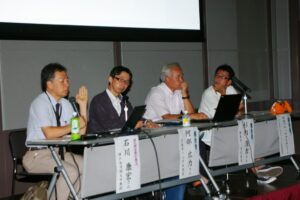Education Forum7 “Challenges for Children and School Three and Half Years after March 11”

Since 2011, “National Assembly for Educational Research” has taken up this topic every year. The Forum in 2011 heard the reports from the region hit by the earthquake and tsunami and shared the information about the enormity and gravity of the damage. In 2012 and 2013, the participants were to face the realities of the local communities hit by the disaster struggling to recover from the destruction. The most touching moment in this year’s forum was when a high school student from Fukushima spoke about the situation in his prefecture, another high school student from Aichi Prefecture who had worked as a volunteer in the reconstruction operation in Fukushima stood up to say that they should work together hand in hand “in solidarity” .
At the 2014 Forum, Yasuhiro Ishikawa, Professor at Kobe Jogakuin University spoke about the considerable delay in reconstruction. He said that the delay is attributable to the business circles that want to take advantage of the catastrophe for making money and the Government that tries to impose the principle of “self-reliant and self-supporting” recovery on the local population. In that context, each individual victim is left behind helpless and incapable of rebuild his or her livelihood or even find a job. The Professor insisted that this is the area where the Constitution should be invoked and applied to help the victims getting back on their feet.
Three and half years after the earthquake, Mr. Kohriki Abe, an elementary school teacher in Miyagi Prefecture, talked about the actual situation in his prefecture where children are getting desperate and teachers giving up teaching. As life in narrow temporary houses where it is often too cold in winter and too hot in summer is protracting, children are all under pressure and frustrated. Teachers want to provide them with appropriate education they need in this condition, but the priority is given to the “race for better academic achievement” prevents them to do so. Miyagi Prefecture Teachers’ Union presented the “Disaster Prevention Check Sheet” it had developed to better cope with natural disasters.
Mr. Seikichi Sugiuchi, a high school teacher in Fukushima Prefecture spoke about the situation of children in his prefecture who have lost their friends or school or a safe place to play in due to the fact that a huge area is designated contaminated no-go area after the nuclear power plant accident. He said that the prefecture authorities had told teachers who asked for “dosimeters school children can carry with them” that it would frighten them if they know that they are exposed to high radiation doses and that teachers had better keep focused on the improvement of children’s academic ability. He concluded that it was important to share information and trust in the power of science without trying to impose a particular opinion or attitude about radiation, respecting the difference in the sensibility to this question.
Mr. K * Blacktiger representing the “Youth Union for Closing Ikata Nuclear Plant (a plant in Ehime, near Kagawa, whose operation has been stopped)” told that he had been a slave of the safety myth of nuclear plants and called on young people to create an organization of their own to act to prevent a nuclear accident similar to that in Fukushima from happening in Ehime. Their group has organized many small seminars, invited as lecturers persons who had moved from Fukushima to Ehime or representatives of the local people living near Itaka Plant. He said that is was gratifying to know that these people were very happy that young people were keen to know about their situations and problems.
After having heard eight people asking questions or commenting what had been said, the Forum concluded that “In the current context, school alone is not able to protect children. We must work hand in hand with local communities to transform our society”.
